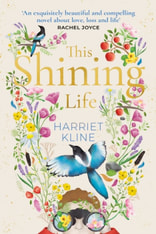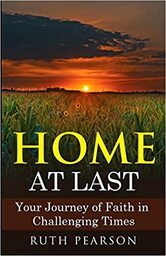Home at Last by Ruth Pearson is about faith journeys and trusting in God during challenging times. Ruth uses Biblical stories such as the Prodigal Son, Joshua, and Ruth and Naomi to demonstrate a journey in faith, while focusing on keywords, including relationship, engagement, trust, obstacles, love, forgiveness and promise. There is a sense of hope that this journey is not a road we have to travel alone. Characters in the Bible, as far back as Noah and Abraham, conducted faith journeys. Now it is our turn to find and have a fulfilling relationship with God.
The book contains three questions, to which it continually refers: 1. How important is God in your life? 2. Do you have a personal relationship with God? 3. Where are you planning to spend eternity? The first two are well-used in books of this nature, but I had not thought about the third question concerning our place in eternity. So, this was particularly useful for me. I liked the idea we should have a plan but that it is God’s plan which is paramount, and that we have an integral place in God’s plan. For example, Rahab had no idea about Jesus Christ, yet she played her part in God’s plan and became part of Jesus’ family tree. This reminds us that, even if things do not go well for us, we must trust we are part of a bigger plan where God is in control. While we cannot see our place in eternity, we will one day look back and realise that, because of what we did, positive consequences occurred. Ruth includes some good exercises, such as describing who you think you are. E.g. I am a Christian, I am an uncle, I am a child of God etc. A list of ten “I am”s remind us of our importance. These exercises helped me extract a great deal from this book to guide my thinking and the progression of my faith journey, aligned with God’s will.
0 Comments
 Title: This Shining Life Author: Harriet Kline Rating: 4/5 Expected Publication: 3rd June 2021 Publisher: Doubleday ISBN13: 9780857526274 Ollie's Dad died. Richard had an incurable brain tumour, and before he passed away, he sent everyone a special present. He also told Ollie that "being alive was like a puzzle and it was all falling into place." Ollie is autistic. He thinks his father left him a puzzle to solve. Could it involve the gifts? Why won't anyone help him solve the puzzle?
This Shining Life by Harriet Kline is a heartbreaking tale about a family coming to terms with death. Told from several people's point of view, Kline explores different portrayals of grief. Ollie's mum wants to stay in bed; his aunt wants life to carry on; his maternal grandmother tries to exert control; his paternal grandmother wishes she could understand her grandson; and his grandfather has no idea what is going on. No one has time for Ollie and his obsession with his puzzle. Before Richard's death, Ollie dominated family life. Ollie had a strict routine, always had a few spare pairs of socks with him because he hated dirty ones, and had meltdowns if his parents used the "wrong" tone of voice. Without his familiar habits, Ollie's life was a mass of confusion - an apt metaphor for the grief the rest of the family experienced. With a contemporary novel such as This Shining Life, there is no "happy ever after". People do not come back from the dead. There is no answer to the meaning of life. Grief is a long process and different for everyone. It causes depression, anger and confusion, but hidden under all these negative feelings is love. Harriet Kline takes death and grief seriously but adds a touch of humour to the narrative for the reader's benefit. It is not a light read, nor is it markedly profound. Instead, This Shining Life is painfully honest, and for that reason, it is beautiful. Dear All,
I do not often, in fact, I cannot remember if I have ever spoken about my vulnerabilities, but two or three evenings ago, my mind was not in a good place. A coping technique I have devised over the years is to write my concerns in a book. This refines the issue, depersonalises it, and gives me an element of clarity to ensure a way forward, which I put into practice in the morning. Having written my problem, I go back to bed and sleep swiftly follows. During one of these moments, prayer struck me at a different level of intensity. Before I offer you this prayer, which helped me significantly, I wish to share the idea through the context of something I read in a daily motivation article: “Only in my pain, did I find my will. Only in my chaos, did I learn to be still. Only in my fear, did I find my might. Only in my darkness, did I see my light.” The prayer that gave me so much peace is attributed to St Teresa of Ávila: “Let nothing disturb you. Let nothing frighten you. All things are passing. God alone is changeless He who has patience wants for nothing He who has God has all things. God alone suffices.” We all have a daily prayer life, but sometimes it may seem our prayers are just part of our routine. It is only when one is on the rocks of despair that prayers may speak to you, help you, encourage you and move you forward. So, I offer St Teresa’s prayer for anyone who suffers from bouts of apprehension. Blessings, Martin |
©Copyright
We are happy for you to use any material found here, however, please acknowledge the source: www.gantshillurc.co.uk AuthorRev'd Martin Wheadon Archives
June 2024
Categories
All
|


 RSS Feed
RSS Feed